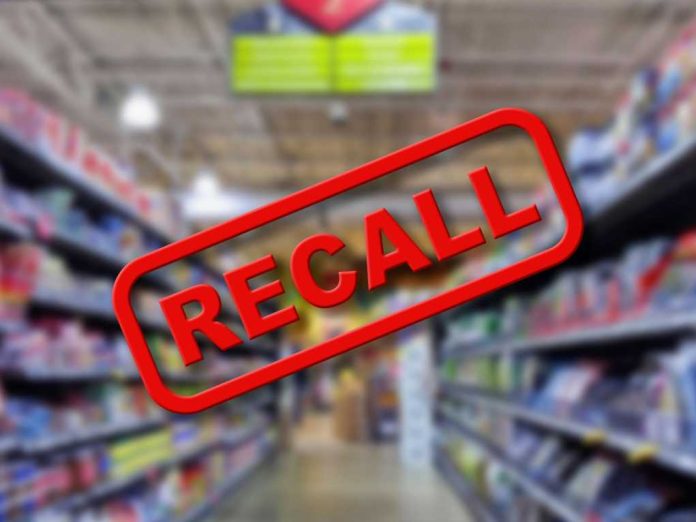
One bite of canned fruit should never put your family’s health at risk—yet millions of Americans just found out their pantry staples might be hiding a dangerous secret.
Story Snapshot
- Walmart recalled canned fruit in 27 states over alarming lead contamination concerns.
- No illnesses have been reported, but consumers are urged to check their shelves and act fast.
- The recall highlights rising anxieties about food safety and supply chain trust in America.
- Industry, regulators, and shoppers now face urgent questions about how lead slipped into everyday groceries.
Lead Contamination Spurs Nationwide Recall, Testing Trust in Food Safety
Walmart’s September 2025 recall of canned pear halves and fruit cocktail, triggered by FDA testing that revealed elevated lead levels, sent shockwaves across 27 states and into the homes of anyone who thought their fruit salad was the least of their worries. Pacific Coast Producers, a giant in American fruit canning, found its products pulled from shelves not just at Walmart but also at Wegmans and other major grocers, setting off a scramble by families and retailers to locate and remove the tainted batches. The scale of the recall—stretching from coast to coast—underscores just how interconnected our food supply has become, and how a single weakness in the chain can ripple to dinner tables nationwide.
Consumers are still grappling with the idea that a trusted pantry staple could become a health hazard overnight. While reassuringly, no illnesses have been reported as of October, the FDA’s proactive approach and Walmart’s swift removal of products point to a new era of “better safe than sorry” in food retail. Shoppers were urged to check cans for specific lot numbers, dispose of or return affected goods, and monitor updates as investigations continue. The FDA, Walmart, and Pacific Coast Producers all issued public statements, emphasizing their commitment to public safety and pledging full cooperation with authorities. But behind the PR, one question echoes: how did lead—one of the most notorious toxic metals—end up in canned fruit at all?
Tracing Contamination: Supply Chain Under the Microscope
Lead contamination in food is not new, but it remains rare and alarming in products as mainstream as canned fruit. Investigations focus on every link in the supply chain: orchards, water sources, packaging materials, and even the machinery used during canning. Pacific Coast Producers, which supplies fruit under numerous private labels, faces tough scrutiny over sourcing and quality control. Regulators are probing whether the contamination originated from environmental exposure in orchards, was introduced during processing, or resulted from tainted packaging. Previous recalls for lead have typically centered on imported candies or spices, not homegrown fruit, making this incident an unsettling outlier and raising the stakes for domestic producers. The complexity of tracing contamination in a sprawling, industrialized food system means that even with modern safety protocols, detection often comes only after products reach store shelves.
Beyond the technical investigation, the recall has exposed the delicate balance between efficiency, scale, and safety in the modern food industry. Supply chain experts warn that as companies consolidate sourcing to drive down costs, a single quality control failure can have exponentially greater consequences. Retail analysts predict that brand trust—painstakingly built over decades—can erode in an instant if companies fail to act transparently and decisively. The recall may have spared consumers from immediate illness, but the psychological impact is hard to measure: every unopened can now carries a seed of doubt about what’s really inside.
Consumer Anxiety and the Push for Stricter Oversight
For American households, the recall has prompted more than a pantry purge—it’s fueled a broader unease about food safety. Shoppers are demanding clearer labeling, more frequent testing, and faster public notification when contamination hits. Social media buzzed with stories of families tossing out groceries and urging friends to double-check their cupboards. Lawmakers and advocacy groups are seizing the moment to call for tougher oversight, arguing that if lead can slip through the cracks at Walmart, nowhere is immune. Economic ripples are already being felt as Pacific Coast Producers and Walmart brace for financial fallout from product disposal, refunds, and possible lawsuits. The long-term damage to reputation and consumer trust may prove even costlier.
Walmart Just Recalled Canned Fruit Due to High Levels of Lead – EatingWell https://t.co/0MfyeDP6Xm via @GoogleNews
— Johnnie M. Brown (@JohnnieMaeBrown) October 22, 2025
Industry insiders and food safety experts alike are split on how much blame should fall on regulators versus manufacturers. Some applaud the FDA’s rapid response as proof of a working system; others see it as a wake-up call for more rigorous preventive controls. What’s clear is that the incident has put the spotlight squarely on the unseen journey our food takes from field to fork. As the investigation continues, expect new calls for reform and a fresh wave of vigilance every time Americans reach for a can opener.
Sources:
Keyw.com: “Canned Fruit Recall Affects Walmart Stores Across WA State”
Walmart Corporate: “Product Recalls”







